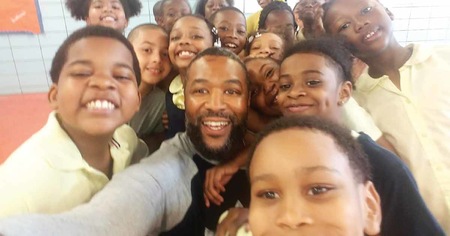In the face of a new and uncertain school year, continued violence against Black lives, a virus that threatens our health and well-being, and an impending election that will be divisive no matter the outcome, our aching for normalcy is only exacerbated. We might know intellectually that we are not alone in our feelings, yet it is increasingly common to feel isolated, disconnected, detached and disoriented.
We are living in a moment when feeling like we belong and cultivating environments where others feel like they belong is more important than ever. But how do we do this meaningfully, when so many of our jobs are on the line and when we have truly no idea what is going to happen next?
I have found that belonging is a feeling that has the power to transcend and transform even the most catastrophic, uncertain, and seemingly desperate times. And as I consider ways the afterschool field can ensure its sustainability, building belonging feels like a really good place to start.
What is belonging? Why does it matter?
People have an inherent desire to belong, to build meaningful relationships and to feel like an important part of something greater than themselves. At work, belonging is what allows employees to feel like they can be their authentic selves and share their lived experiences without fear of different treatment, punishment, or exclusion. Belonging at work is important for both full- and part-time employees and is often especially challenging for people with marginalized identities who feel pressure to adapt, assimilate, code-switch, or hide components of their identities to fit in, be noticed, or even keep themselves safe. Employees who regularly feel these pressures are more likely to feel stress, confusion, frustration and inferiority at work—all factors that could adversely impact your program's outcomes.
There is a huge psychological cost to employees who feel they cannot truly be themselves at work, and research shows that the pain experienced through interpersonal loss, rejection, and exclusion triggers the same neural circuits as physical pain. When this pain occurs in work settings, it directly impacts the performance, productivity, engagement, innovation, commitment, collaboration, and success of our programs and organizations.
Because belonging is something people feel internally, it can be hard to see or feel how much lack of belonging might be affecting your program. If you feel like you belong, it is also easy to believe everyone feels the way you do.
Further complicating matters, belonging might look and feel different in different corners of your program or organization (i.e., people might feel like they belong in their program but not in the organization, or with a particular group but not with their boss). Most people will never speak up and say they don't feel like they belong, because of a primal fear of additional exclusion. The bottom line is that belonging is HARD. And it is up to us to actively disrupt mindsets, behaviors, and policies that implicitly or explicitly exclude, devalue, or harm the human beings who work with and for us. While it's not a simple undertaking, there are some things you can do right away to build belonging in your team, even now when things might feel impossible.
1. Pay attention to belonging (or lack of belonging) at every layer of your program or organization. It's not enough to just look at how people behave. We must also investigate practices, systems, institutions and cultures that may contribute to lack of belonging.
2. Know the warning signs of lack of belonging and ask questions if you suspect that someone on your team does not feel like they belong.
3. Move beyond DEI language. "Diversity" forces us to beg the question, "Diverse from what?" And most often, our diversity bar in the United States is measured against white, heteronormative men. In addition, inclusion is not a sufficient end goal. Our programs and organizations will only be successful when every voice and body is not only included at the table but is also seen, heard, valued, celebrated, and treated with dignity and respect, both at the table and beyond it. Only in those conditions can true belonging be fostered.
4. Follow the platinum rule: Treat others the way THEY want to be treated. We cannot assume others want to be treated the way we want to be treated and we need to get to know the preferences of our staff to make them feel like they truly belong.
5. Allow for vulnerability and the full spectrum of human emotions (even the unpleasant ones) in your program and staff spaces.
6. Cultivate spaces where staff can be authentic and courageous without fear of being excluded, ostracized, discriminated against, or punished.
7. Schedule intentional opportunities for your team to come together to build relationships and get to know each other not just for what they do, but for who they are.
8. Prioritize clear, transparent, and honest communication and feedback.
9. Center intersectionality with the understanding that our program goals cannot be separated from workplace culture, employee relationships, and the human experience in all its complexity.
Fostering belonging in your afterschool staff team will not happen overnight and requires intentional, consistent, and serious effort, every hour of every day. Even then, we must remember: It is harder to build belonging than it is to destroy it. Through every decision we make, every word we use, and every moment of glory or pain, afterschool leaders hold the power to build their people up or to tear their people down; to make staff feel valued, included, and important; or to make staff feel excluded, dismissed, or rejected. In that power lies responsibility. Are you inspired and empowered to take it?
Reloveution is partnering with two female- and minority-owned businesses on a four-month initiative for individual leaders and institutional teams. Belonging Builders will support participants in exploring current workplace dynamics, diagnosing challenges related to belonging and inclusion, and creating workplaces that center the full human experience.
As a thank you to our NAA supporters, partners and family, we are holding three partial scholarships for NAA members. Learn more and sign up at Belonging Builders or reach out to marissa@truereloveution.com.
Written by: Marissa Badgley, MSW, is the Founder of Reloveution and is on a mission to transform the world of work through the power of compassion and humanity. She is also an NAA Advocate Member.




